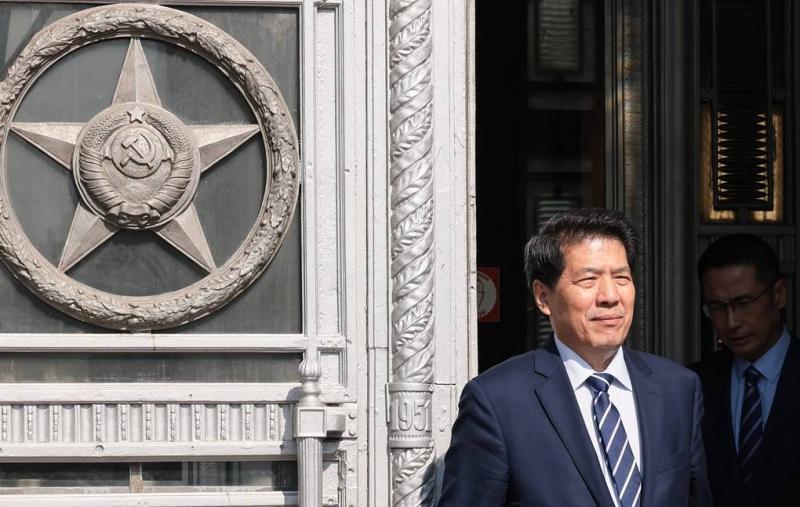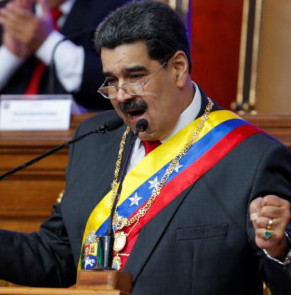
China plans to dispatch its special envoy to Russia, Ukraine and key European countries next month to conduct another round of peace-seeking shuttle diplomacy; the European Union will soon unveil its new defense strategy to mass produce weapons internally within the bloc; Armenian Premier Nikol Pashinyan is pushing hard for Yerevan’s new pro-Western strategic tilt. These stories topped Thursday’s newspaper headlines across Russia, according to TASS News Agency.
Vedomosti: China to continue shuttle diplomacy efforts toward achieving Ukraine settlement
Chinese Special Representative for Eurasian Affairs Li Hui, who went on his first peace mission last May, will visit Russia, Ukraine and several other European countries next month for the second round of Beijing’s shuttle diplomacy aimed at achieving a political settlement to the Ukraine crisis. He will commence his trip on March 2, Chinese Foreign Ministry Spokesperson Mao Ning announced. According to Russian Foreign Ministry Spokeswoman Maria Zakharova, Li will arrive in Moscow on March 3, where he is scheduled to hold a meeting with Russian Deputy Foreign Minister Mikhail Galuzin.
During his debut peace-seeking tour on May 15-26, 2023, Li met with Ukrainian President Vladimir Zelensky and Russian Foreign Minister Sergey Lavrov. Summing up that mission, Li acknowledged that there are "lots of difficulties and differences" in the Ukraine conflict. At the same time, last year, the Chinese special envoy felt that neither Russia nor Ukraine "has shut the door to negotiations forever."
China is still seeking to broker a resolution to the Ukraine crisis, Yana Leksyutina, professor at St. Petersburg State University, told Vedomosti. Beijing may be intensifying its efforts against the backdrop of increasingly loud rhetoric about the need to put an end to the conflict, she added.
China is trying to gain a greater understanding of the parties’ current positions, as the situation has changed since 2023, said Vasily Kashin, director of the Center for Comprehensive European and International Studies at the Higher School of Economics (HSE University). Active discussions on what to do next as regards the conflict are now taking place among Kiev’s Western sponsors given the utter failure of last year’s much-hyped Ukrainian counteroffensive, and China will decide how to proceed once it hears from those countries, he explained. Meanwhile, the Ukraine-China relationship has deteriorated over the past year, which is an inevitable outcome for Eastern European countries that are firmly within the United States’ sphere of influence.
China may yet play a role in achieving peace in the conflict, as, unlike Russia, it has maintained active communications with the West. At the same time, the US is seeking to prevent another diplomatic win for China, like the one it had in 2023, when it brokered a successful normalization of relations between Saudi Arabia and Iran, the expert concluded.
RBC: EU to draft own defense strategy with focus on keeping weapons production within bloc
The European Union is finalizing its strategy aimed at increasing defense purchases within the bloc. By 2025, the EU plans to manufacture more than 2 mln rounds of munitions annually using its own intra-bloc resources.
Against the backdrop of ongoing hostilities in Ukraine, the EU is getting ready to overhaul its defense policy. Next month, the European Commission (EC) will present its new European Defense Industrial Strategy (EDIS). At Wednesday’s session of the European Parliament, which was devoted to discussing European security and defense, EC President Ursula von der Leyen promised to unveil the document in the coming weeks.
Under a draft of the document, as seen by Bloomberg, the EU will aim to make half of all defense procurement contracts within the bloc by 2035, which will reverse the recent trend of buying the bulk of its military equipment from third countries. The new strategy will envision making joint EU investments in the defense sector, ensuring the security of critical supplies and tweaking the European Investment Bank’s lending policies, Bloomberg said.
In line with the paper, the EU will need to mass produce ammunition, drones and other critical defense items. Moreover, the EU member states are facing hybrid threats, including cyberattacks, sabotage and hacking of critical infrastructure. Europe will also need to protect its access to the maritime, air, cyber and space domain.
Sergey Oznobishchev, sector head at the Department of Military-Political Analysis and Research Projects in the Center for International Security at the Russian Academy of Sciences’ Institute of World Economy and International Relations (IMEMO RAS), said that all European countries had incentives to expand defense production given recent military and political circumstances. To him, the revival of defense production in Europe indicates that common policy results in disarmament have collapsed. "Nevertheless, everybody will see that such an approach is a dead-end somewhere in foreseeable future, and they will have to revisit the need to jointly limit armaments, including in Europe, under new agreements," the expert forecasts.
Kommersant: Armenian Premier Pashinyan pushing Yerevan’s new pro-Western strategic tilt
The foreign ministers of Armenia and Azerbaijan are currently discussing a peace treaty in Berlin at the initiative of German Chancellor Olaf Scholz. The relocation of the peace process to a European venue under a plan being pushed by Yerevan comes amid a series of meetings between Armenian Prime Minister Nikol Pashinyan and Western leaders.
Yerevan’s demonstrative tilt toward the West is becoming a hot issue fueling Armenia’s internal political strife. "The worst predictions are coming true. By pursuing his foreign policy course, Pashinyan is bringing the global war being waged between Russia and the West home to Armenia. And the West is seeking to expand its anti-Russian front to run through Armenia. That will be destructive for Armenia," Armenian politician Armen Rustamyan warned. Such a policy course may lead to Armenia losing its sovereignty and Russia being squeezed out of the region.
Following headline-making statements about Armenia’s decision to suspend its membership in the Collective Security Treaty Organization (CSTO), Yerevan is now mulling ordering Moscow to withdraw the Russian border guards currently stationed at Yerevan’s Zvartnots International Airport. "Armenia is capable of patrolling and defending its borders on its own," Armenian Parliament Speaker Alen Simonyan said as he accused officers of Russia’s Federal Security Service (FSB) of making the South Caucasus country’s borders "more vulnerable."
Against this background, Ukrainian President Vladimir Zelensky’s pending visit to Yerevan may soon become a more potent irritant in Russian-Armenian relations. "If Zelensky does pay a visit, this would be a provocation against Armenia and a point of no return for the relationship between Armenia and Russia," opposition lawmaker Gegam Manukyan argues.
While Pashinyan’s office has not yet officially confirmed that Zelensky will visit, members of Armenia’s ruling party concede that the visit is within the realm of possibility. "As a faction member, I am unaware if Zelensky will visit, but I do not find it [the visit] impossible. Like other presidents, he can visit Armenia, unless there is a special ban," parliamentarian Babken Tunyan said. A fellow parliamentarian, Gurgen Melkonyan, the country’s former defense minister, agreed: "If Zelensky decides to visit Armenia, Yerevan will receive him." "We do not care how Russia will react if Zelensky visits," he added.
Izvestia: US risks losing influence in Pacific as no end seen to congressional wrangling
The US Congress’ failure to pass critical appropriations bills amid serious internal disagreements may affect Washington's interests in the Asia-Pacific region. In particular, members of Congress have reached an impasse regarding support for, among other funding recipients, a number of Pacific Ocean island countries under the Compact of Free Association (COFA). The COFA encompasses the Federated States of Micronesia, the Marshall Islands and Palau, which, although geographically miniscule, have a strategic importance that looms large for Washington in its struggle with Beijing for influence over the region.
The US was due to allocate $2.3 bln for the three countries back in October 2023. The sum is quite manageable for the US budget, unlike the $60 bln in additional aid for Ukraine that the administration of US President Joe Biden is requesting, and yet Congress is still deadlocked over aid for the Pacific island nations. The Senate and the House of Representatives are still unable to agree on an aid package that includes more funding for Ukraine, Israel and US allies in Asia-Pacific, as well as for a US-Mexico border barrier, a budget item that remains a stumbling block between Congress and the White House. The latest attempt to reach a compromise failed earlier this month.
"The Americans are currently too focused on their confrontation with China, and therefore any Chinese presence is being viewed as a threat," Alexander Lomanov, deputy director of the Russian Academy of Sciences’ Institute of World Economy and International Relations (IMEMO RAS), told Izvestia.
The approval of funding is also being delayed as Congress must first approve the US’ annual budget by the March 1 deadline in order to avoid a partial government shutdown.
Meanwhile, the leaders of the island nations themselves are seriously concerned over the funding bottleneck, as they state bluntly that every day of delay undermines the interests of the United States. And all of these island nations could be of strategic interest to China, as the East Asian powerhouse actually has no direct access to the Pacific Ocean. At least in the next few decades, Beijing would not deploy military bases on the island nations as it does not project its military power abroad, unlike Washington, Lomanov added. In fact, given the spread of US bases, China has more to be afraid of than does the United States, the expert concluded.
Kommersant: Future of Gazprom gas supplies to Europe remains in doubt
With nine months to go until the Russia-Ukraine gas transit agreement expires, Russia’s remaining European energy customers and Russian gas giant Gazprom still have no idea how to jump-start negotiations on continued Russian gas exports to the EU.
The contract for the transit of at least 40 bln cubic meters of natural gas annually between Gazprom and Ukraine, which was signed at the end of 2019, will expire on January 1, 2025. Since the hostilities in Ukraine began, gas pumping volumes have shrunk by many fold, while Ukraine has repeatedly said that it would not discuss renewing the contract. On Wednesday, European Commission Spokesperson Tim McPhie said that while alternative supply routes are currently being discussed with those EU countries that will be affected, continued transit is not being considered.
In theory, there are two options for keeping the Russian gas supplies flowing: by either continuing transit through Ukraine or supplying the relevant volumes through Turkey. However, negotiations on setting up a gas hub in Turkey are not at an active stage, and the initiative is coming more from the Russian side, government officials told Kommersant. As for the delivery of gas on the border with Ukraine, no substantive negotiations on such an option are taking place either.
Maria Belova at Implement believes that transit via Ukraine remains the main scenario. "Amid a substantial decline in export volumes, Gazprom should be interested in continued gas supplies along this route," she insists. Also, Gazprom could run swap gas supplies to Europe via Azerbaijan, the analyst added.
Gazprom is seeking to continue transiting natural gas via Ukraine. Although this scenario is the most realistic, with the participation of European companies, it may turn out to be unprofitable if Kiev increases its gas pumping tariffs, Sergei Kondratyev from the Institute of Energy and Finance Foundation warned.
TASS is not responsible for the material quoted in these press reviews









